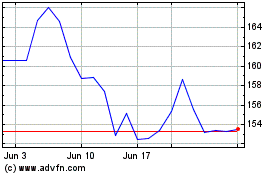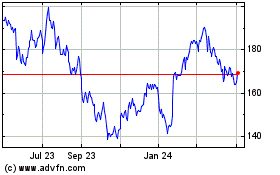Pandemic Chips at Beauty Retail's Bricks-and-Mortar Stronghold
December 31 2020 - 11:25AM
Dow Jones News
By Jinjoo Lee
Some things are just a tough sell online. Traditionally, makeup
and fragrances have fallen squarely in the category of goods that
consumers want to sample in person. Yet even this industry may not
be immune to the pandemic's effects on consumer behavior.
Major department stores like Nordstrom and Macy's got around a
quarter of sales through e-commerce channels in the fiscal year
ended Feb. 1. Cosmetics retailer Ulta Beauty, however, derived only
13% of its sales online.
Yet e-commerce sales are growing fast at Ulta: by 200% in the
quarter ended Aug. 1 compared with a year earlier. Even when stores
had fully reopened, online sales were up 90%, hinting at some
e-commerce stickiness.
This might pose a dilemma for beauty retailers. Push hard on
e-commerce and they risk making consumers too comfortable with
online shopping, potentially lowering the barrier for online
competition and rendering their store fleets obsolete. A similar
dynamic has played out with apparel, for example, as newer
competitors flooded the market, notes Simeon Siegel, an analyst at
BMO Capital Markets.
On the surface, Ulta Beauty's decision to place its shops inside
Target stores and Sephora's plan to set up inside Kohl's department
stores look like bets on traditional bricks-and-mortar. But look
more closely and they are also smart hedges against an online
future. These setups require less resources than stand-alone stores
and also include an online component, as Target and Kohl's will be
showcasing Ulta Beauty and Sephora's products on their
websites.
The online share of sales of beauty products -- defined as
prestige products sold in department stores and specialty retailers
such as LVMH-owned Sephora -- roughly doubled in 2020, accounting
for nearly half of all sales, according to Larissa Jensen, beauty
industry adviser at market research firm NPD Group. And yet,
overall sales have declined. Through November, beauty product sales
were down 21% compared with the same period of 2019, according to
NPD Group data.
Still, consumers' newfound familiarity with buying beauty
products online could have far-reaching impacts. Even when
consumers choose to go out to shop in person again, there is the
risk they will treat bricks-and-mortar stores as showrooms --
places where they try out products but ultimately transact online.
That will be less of a concern if customers are going directly to
those retailers' websites, but a headache if they migrate
elsewhere.
Amazon is dipping its toes into beauty, just as it has with a
few luxury brands. The category is attractive: Makeup and fragrance
tend to be high margin, small in size, popular as gifts and also
something that needs replenishment. In 2019, Amazon announced a
deal with Lady Gaga's beauty product line.
Beauty retailers might take comfort in Best Buy's example. The
retailer was once known as Amazon's showroom for electronics, but
impressively managed to hold on to its market share through
investing in e-commerce capabilities and creating a great in-store
experience.
Ulta Beauty and Sephora can end up like Best Buy if they make
the right moves now, or else face the fate of Barnes &
Noble.
Write to Jinjoo Lee at jinjoo.lee@wsj.com
(END) Dow Jones Newswires
December 31, 2020 11:10 ET (16:10 GMT)
Copyright (c) 2020 Dow Jones & Company, Inc.
LVMH Moet Hennessy Louis... (PK) (USOTC:LVMUY)
Historical Stock Chart
From Jun 2024 to Jul 2024

LVMH Moet Hennessy Louis... (PK) (USOTC:LVMUY)
Historical Stock Chart
From Jul 2023 to Jul 2024
